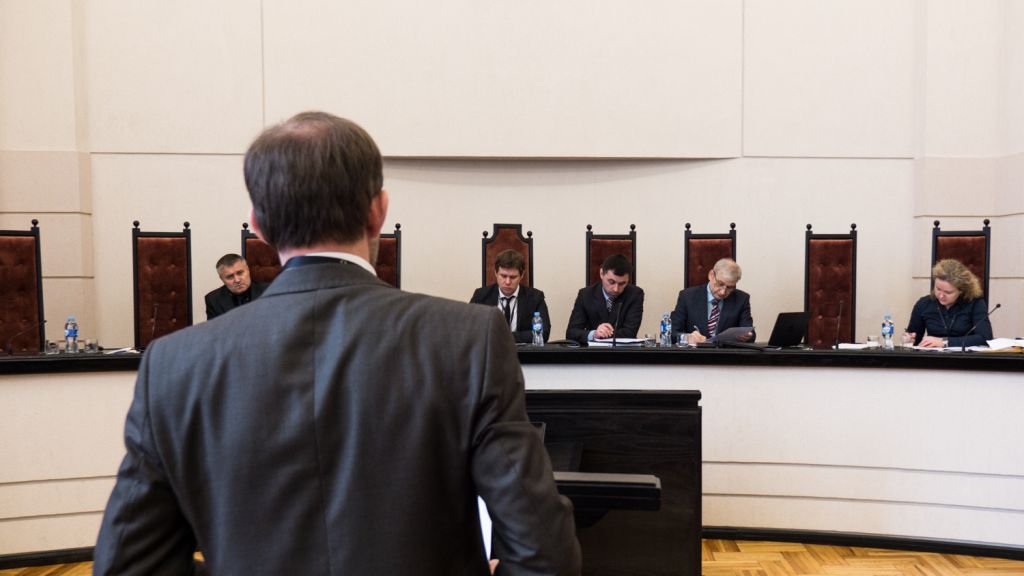During the year, lawyers from Azerbaijan, Belarus, Moldova, Russia and Ukraine gained the theoretical knowledge on how to apply the international and European human rights protection mechanisms, and how to work with the international standards at the national level. The final conference, which brought together the students with the best academic results, allowed the graduates to apply the obtained skills in the moot court, to discuss plans for further joint work and get practical recommendations from the international experts. The organizers chose the format of a moot court so the participants could get an idea about how all parties are interacting in the cases and procedures related to the protection of human rights and freedoms.
For the first time the project conference was held in the building of the Constitutional Court of The Republic of Lithuania, and the participants were welcomed by the President of the Court Dainius Žalimas. During his speech to the graduates of the program Dainius Žalimas stressed that currently the protection of human rights requires not only knowledge, but also courage: “Taking into account the problems currently facing civil society in Azerbaijan, Belarus, Moldova, Russia and Ukraine, the lawyers, who are ready to actively defend human rights, are especially important to ensure that the situation is changing for the better. I want to note that human rights belong to everyone, without exceptions. However, as long as people are not aware of these rights and do not see positive examples, the words “human rights” are empty and meaningless.”

Dainius Žalimas, President of the Constitutional Court of Lithuania, speaking on the first day of the conference.
Further, Dainius Žalimas expressed his belief that with the support and training of lawyers, the situation may change for the better: “The key factor in creating a harmonious, open, and democratic society is the freedom of every person to defend the inalienable rights and liberties without fear and repression. I believe that positive change is just a matter of time.”

Maria Ślązak, former President of the Council of Bars and Law Societies of Europe (CCBE)
Maria Ślązak, former President of the Council of Bars and Law Societies of Europe (CCBE), also spoke at the opening, expressing her admiration for ILIA lawyers: “Human rights lawyers are under threat. I’m am impressed by your commitment to continue to work on these issues.”
On the second day of the conference, the participants, alumni, and international experts discussed a series of issues essential to the successful implementation of international human rights standards and mechanisms. The first session focused on the role of constitutional courts in the process of implementation of international human rights standards at the national level, while the second elaborated on international mechanisms of protection and professionalization of human rights lawyers and in what circumstances it is best to use each respective mechanism.

ILIA participants engaged in moot court human rights case
Having brought together experts and participants from different countries, the final conference thus marked the end of the course and at the same time gave a start to a new phase of activities of the lawyers-graduates, who became the part of the human rights community.

Ane Tusvik Bonde (Regional Manager, Eastern Europe and Caucaus, Human Rights House Network; Oleksandr Lapin (Lawyer and recent ILIA graduate – Donetsk/Kiev, Ukraine)
*****************
“International Law in Advocacy” is a Human Rights House Network program to improve the professional knowledge and skills of lawyers from the Eastern Europe and South Caucuses region in the field of human rights, and to strengthen civil society in participating countries. The curriculum of the program has been successfully certified by the experts of the European Humanities University (EHU) and has been awarded academic credits in compliance with the European Credit Transfer and Accumulation System (ECTS). Courses focus on using the knowledge gained by students in advocacy work and in implementation in their home country. The program also fosters an active, international network of alumni lawyers. The ILIA program is sponsored by the Royal Norwegian Ministry of Foreign Affairs.
Related articles
The opportunities to work with international standards: experience of Belarusian ILIA graduates





